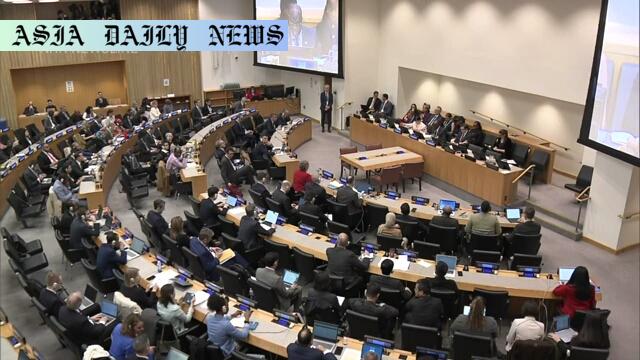Nuclear Disarmament: Delegates from the US, China, and Russia clash over responsibilities as nuclear powers at a UN meeting.
Delegates from the US, China, and Russia engaged in pointed discussions about nuclear disarmament at a UN meeting in New York.
Accusations flew as the US criticized China and Russia for nuclear buildup, while the latter two countries called for equal disarmament responsibility.
All three nations emphasized the importance of the NPT framework, which collectively governs nuclear non-proliferation efforts.

Delegates from the United States, China, and Russia convened this week at the United Nations headquarters in New York to address nuclear disarmament—an issue that remains pivotal in maintaining global peace and security. The meeting formed part of the Preparatory Committee for the 2026 Review Conference of the Parties to the Treaty on the Non-Proliferation of Nuclear Weapons (NPT). United on paper but divided in execution, these three nations collectively hold over 90% of the world’s nuclear arsenal, thereby wielding unparalleled influence in shaping the future of global disarmament efforts.
Growing Risks Amid Accusations
The United States’ delegate opened the proceedings by highlighting the escalation of nuclear risks in recent years. As global political tensions sharpen, there is mounting concern that the proliferation and modernization of nuclear weapons exacerbate the potential for open conflict. Specific attention was directed toward China, which was accused of rapidly expanding its nuclear arsenal in a non-transparent way, thereby undermining global peace and stability. Russia also faced criticism for innovating “novel nuclear weapons,” which the US implied could destabilize existing strategic balances. Despite these disparaging observations, Washington reiterated its commitment to the principles of the NPT and reducing the risks that nuclear war poses to humanity.
Russia and China: Accusations Met with Deflection
Both Beijing and Moscow pushed back against Washington’s criticisms, framing their nuclear policies as defensive rather than provocative. Russia’s representative attributed escalating tensions to what they described as the West’s consistent disregard for other countries’ core interests. This, they argued, had generated a volatile geopolitical environment that elevated strategic risks. China, meanwhile, rebuked both the United States and Russia for an apparent unwillingness to uphold their unique responsibilities as the two top nuclear-armed states. While recognizing the importance of the NPT framework, China emphasized the disproportionate role that these two players must embrace to steer progress toward meaningful disarmament.
The NPT Framework: Unity in Principle
Despite the heated exchanges, all three nations reaffirmed their commitments to the Non-Proliferation Treaty, which serves as the cornerstone of multilateral efforts to avert the spread of nuclear weapons and advance disarmament. Signed in 1970, the NPT has fostered significant international cooperation by drawing clear lines: nuclear-armed states (namely the US, Russia, China, the UK, and France) acknowledged their statuses but also pledged to work toward eventual disarmament. Simultaneously, non-nuclear states agreed to refrain from developing capabilities in exchange for access to peaceful nuclear technologies. However, the treaty’s utility in addressing modern challenges depends significantly on the compliance of its original signatories.
Looking Ahead: Challenges and Opportunities
While the importance of dialogue remains undeniable, the meeting underscored existential obstacles preventing confidence-building measures among major nuclear powers. Mistrust, competing geopolitical interests, and a growing trend toward nationalism impair the collective ability to arrive at consensus-driven solutions. Against this backdrop, the Preparatory Committee discussions pave the way for the crucial 2026 NPT Review Conference, where unresolved tensions may resurface. However, it is essential that national interests align toward the shared objective of minimizing nuclear risks and promoting worldwide security.



Commentary
Why Nuclear Disarmament Conversations Are Critical
The discussions at the United Nations this week underline the gravity of nuclear proliferation in a precarious global landscape. In an age where great power competition dominates international relations, frameworks like the NPT serve as both a reminder of shared obligations and a crucial mechanism for dialogue. While no breakthroughs occurred during this specific session, the platform itself is vital as it keeps the conversation alive between nations whose actions hold the power to shape humanity’s future. It’s hard not to reflect on the delicate balance that diplomacy must strike to foster meaningful cooperation in an atmosphere clouded by mistrust.
A Mixed Bag of Accountability
What these fiery exchanges revealed is the disproportionate burden placed on nuclear superpowers to take the lead in global disarmament. Both China and Russia made persuasive arguments pointing to the extensive nuclear capabilities of the United States, suggesting the onus for leadership rests heavily with Washington. Yet, the US’s concerns about transparency and technological innovation in Beijing and Moscow are valid too. This cycle of blame and counter-blame shows how political rivalries impede the kind of progress required in tackling nuclear threats comprehensively.
The Road Ahead
It is critical for observers and analysts to remain hopeful yet pragmatic. Diplomatic talks often stall, sometimes regress, but consistent engagement is often the precursor to breakthroughs. Looking ahead, it is essential for nuclear powers to display transparency while embracing reforms that reimagine the current disarmament frameworks for a modern era. The key will be striking a balance between national interests and collective security, a challenge demanding skillful negotiation and authentic goodwill from all parties concerned.